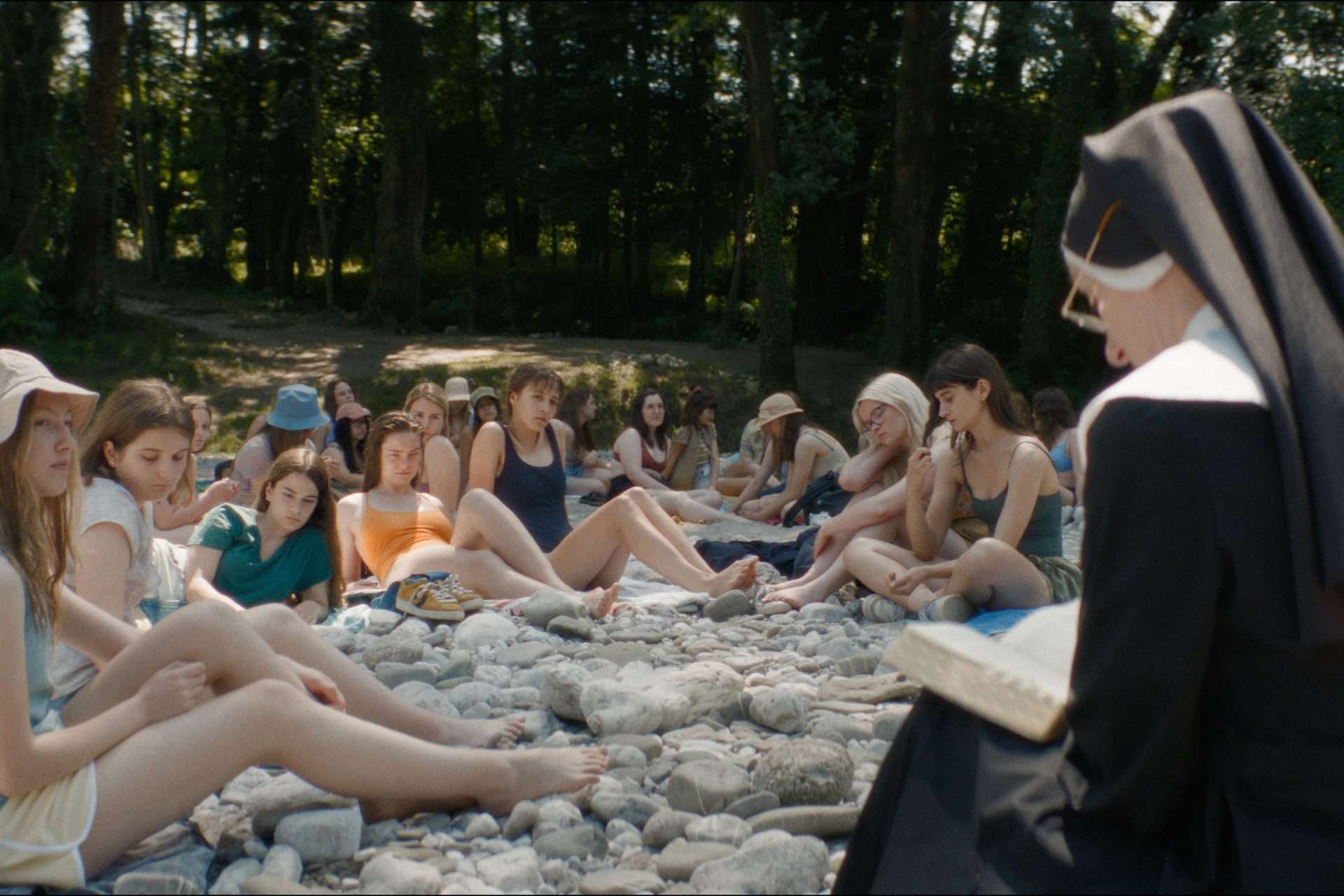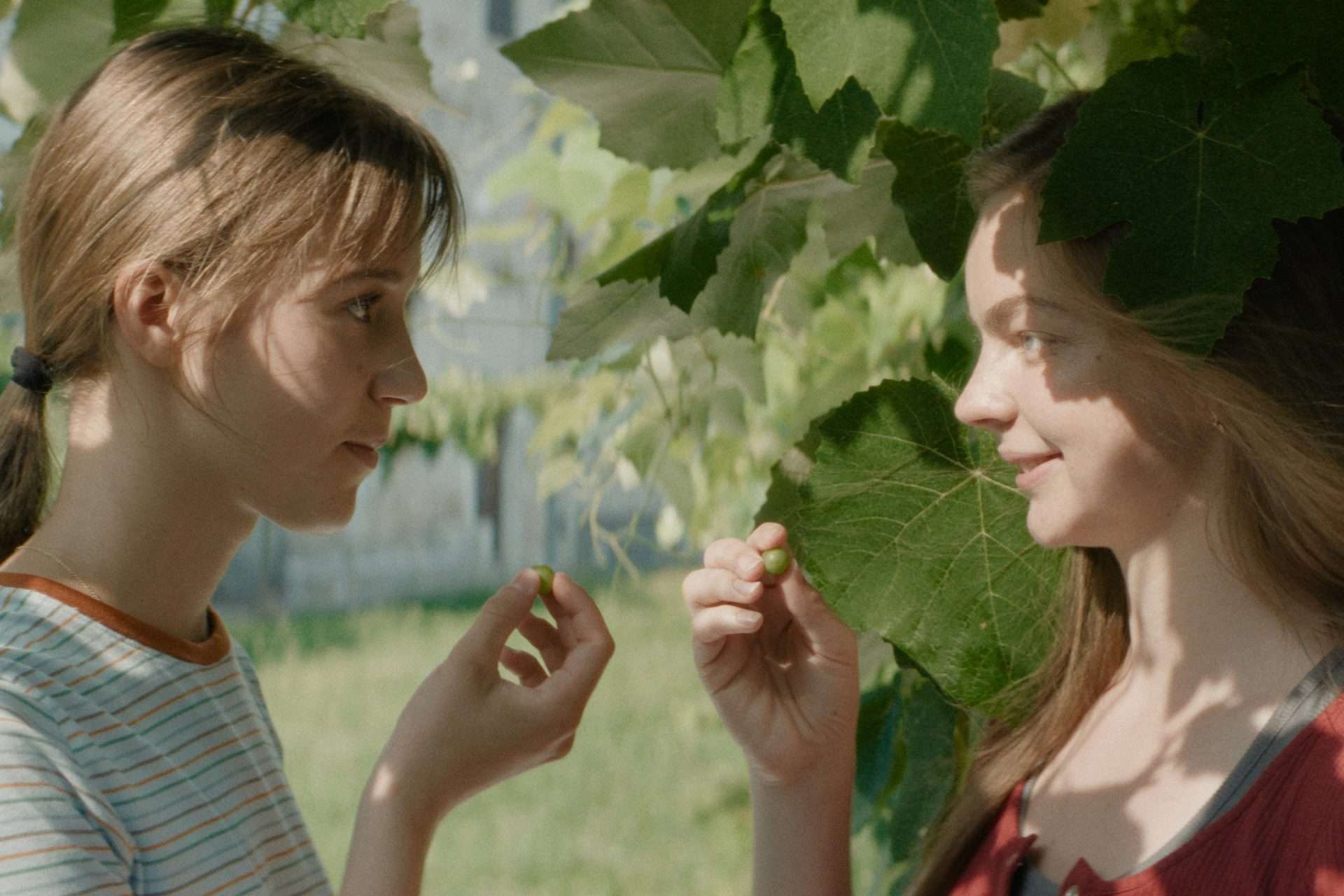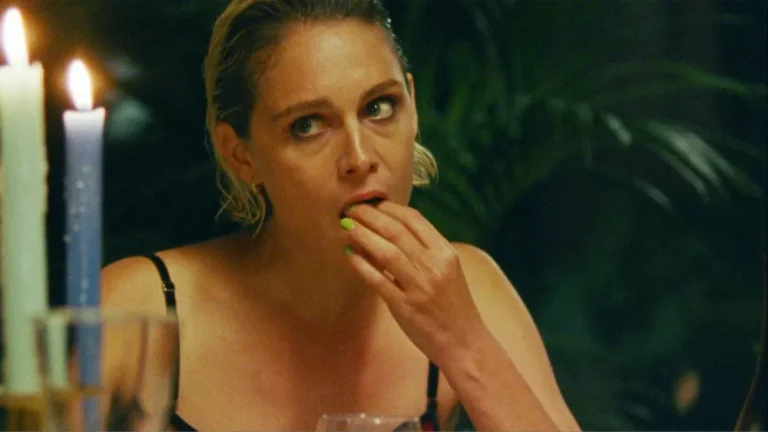Sex, desire fill the air in Urška Djukićs film, “Little Trouble Girls” (Kaj ti je deklica, 2025). It’s inescapable, hurtling at the bunch of precocious teens at the center. No matter how much they may try to look past it, desire barges in without cue, gathering immense pull. We’re introduced to the characters through the prism of a school choir. The 16-year-old Lucia (Jara Sofija Ostan) is reserved and wary in her ways. Her mother implicitly instructs her to keep her distance from her classmates who are curious and embracing adolescence and its instincts for sexual fervor. Even a lipstick is off-bounds, Lucia’s mother emphasises. There’s a very clear line drawn between the good and the bad girl. Lucia must be cautious lest she doesn’t tip over to the other, hushed, reprimanded side of girlhood.
The choir is also an instrument exerting absolute compliance and discipline. No straying is allowed. But with the new entrant, Ana-Maria (Mina Švajger), the decorum at the heavily Catholic school seems to unloosen itself and shatter. There’s something blazing, scorching, and yet light and evasive in the way Djukić films tremors of sexual tension. Everything shivers with erotic possibility, teasing adventure and discovery. It’s that turning point between adolescence and adulthood, heaving with a bid for uncontrollable exploration, which “Little Trouble Girls” evokes with great relish and effortless mischief.

The film’s quickness to set up contrasts between the two girls deepens into an inquiry of infusion. Lucia is as watchful and balking as Ana-Maria is untrammeled and intrepid. Initially, Lucia is taken aback by the other’s cheekiness but can’t also disguise her awe, and latent craving to have some of her attitude. It’s something she grows to covet as well, as much as she tries to repress and deny its expression. Ana-Maria nudges her towards untethering herself from normative morality and prescribing conforming behavior.
Slowly but surely, transgression becomes the language, threatening to burst through at every moment and claim center stage. The film understands the disruptive charge of desire, pulling at the seams of what’s safe and permissible. We are carried through, guided by characters’ lingering, insistent, searching gaze. Though narrative directions and temper may not be boundary-pushing or innovative, there’s a deep, plunging sexual hunger, primal and uncompromising, in the girls which is never sanctified. In fact, the forbidden and the illicit pulse in the hands of Djukić with ferocity and defiance. This is a director who is eager to listen and empathize and put at the forefront the teeming erotic yearning of her characters, and their push to breach the rules.
Also Read: 10 Best Movies That Poignantly Explore Girlhood
Lucia aches for the sensations that whirl within her when her gaze falls on construction workers at the convent where the girls head to rehearse. But she has to reckon with the vocabulary, and tight delineations of Catholic guilt, sin, and punishment that hover before she can break out and follow her impulse. The girls negotiate frameworks of being under the steady watch of the conductor, Bojan (Sasa Tabakovic), who is himself straining to project an exemplary sort of repression. Predan Kowarski’s camera takes these lithe, darting moments, skating close to Lucia’s progressively hankering gaze; this is effectively compounded by Julij Zornik’s aural orchestrations which catch every quivering note. The sound design is key here to establishing a sense of interiority; a hyper-sensory realm is drawn vividly.

Djukić displays a formidable affinity for locating clandestine threads interlocking her characters, placing them in a web of thrumming tension. How do the girls view chastity and flirtations with various contraventions? Can Lucia reorient her understanding of the self beyond a moralizing, restrictive stranglehold? “Little Trouble Girls” wrestles with this question, leading to a frank, brilliant scene when Ana-Maria and Lucia prod the nun at the convent about temptation and the tethers of chastity.
As alert the film is to internal workings, undercurrents of desire, and explosive wish to drift and deviate, it’s precise and direct when it leans into moments of such verbal articulations. The currency this film wields is immediate and scalding. Djukić lets us wander with its young, eager characters, accentuates their throbbing yearning, and pushes back on the faintest of judgment. Tussles in virginhood, between reining in and resisting, electrically animate “Little Trouble Girls.” This is a tremendous debut, keenly observant of rising passion and its see-saw.





![13 Reasons Why [2017]: The importance of reaching out to people](https://79468c92.delivery.rocketcdn.me/wp-content/uploads/2017/04/13.Reasons.Why_.S01E11.720p.WEBRiP.x265.ShAaNiG.mkv_20170415_100221.270-768x432.jpg)
![The Son (El Hijo) Netflix [2019] Review: A flawed Psychological Thriller about the Fears of Parenthood](https://79468c92.delivery.rocketcdn.me/wp-content/uploads/2019/08/The-Son-El-Hijo-768x433.jpg)

